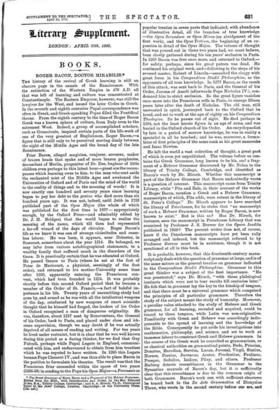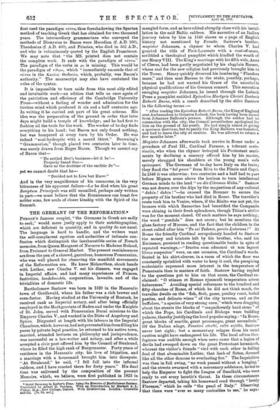BOOKS.
ROGER BACON, DOCTOR MIRABILIS.* THE history of the revival of Greek learning is still an obscure page in the annals of the Renaissance. With the extinction of the Western Empire in 476 A.D. all that was left of learning and culture was concentrated at Constantinople. The Eastern Emperor, however, was still the lawgiver for the West, and issued the later Codes in Greek. In the seventh and eighth centuries Papal correspondence was often in Greek, and Greek-speaking Popes filled the Pontifical throne. From the eighth century to the time of Roger Bacon Greek was a known sphere of culture, from Italy even to the extremest West. Indeed, a group of accomplished scholars, such as Grosseteste, inspired certain parts of the life-work of one of the very greatest of Englishmen, Roger Bacon,—a figure that is still only to be perceived moving dimly between the night of the Middle Ages and the broad day of the late Renaissance.
Friar Bacon, alleged magician, conjurer, sorcerer, maker of brazen heads that spake and of more brazen prophecies, descendant of Merlin, progenitor of Dr. Dee, bugbear of little children even perhaps to this latest hour—great are the recom- penses which learning owes to him, to the man who rent aside the enchanted mist of the Middle Ages and awakened the Universities of Oxford and of Paris and the mind of the world to the reality of things and to the meaning of words ! It is now exactly one hundred and seventy years since learning began to pay her debt to the genius who died more than six hundred years ago. It was not, indeed, until Jebb in 1733 published part of the Opus Majus (the whole of which was published for the first time in 1897 — appropriately enough, by the Oxford Press—and admirably edited by Dr. J. H. Bridges) that the world began to realise the meaning of the name, which till then had represented a far-off wizard of the days of chivalry. Roger Bacon's life as we know it was one of strange vicissitudes and cease- less labour. He was born, it appears, near Bchester, in Somerset, somewhere about the year 1214. He belonged, we may infer from various autobiographical statements, to a wealthy family that suffered much in the disorders of the times. It is practically certain that he was educated at Oxford. He passed thence to Paris (where he sat at the feet of Peter de Maricourt, a physicist, seemingly of the first order), and returned to his mother-University some time after 1250, apparently entering the Franciscan con- vent, which had been founded in 1224. It was probably shortly before this second Oxford period that he became a member of the Order of St. Francis,—a fact of baleful im- portance in his life. Twenty years of unremitting study had gone by, and armed as he was with all the intellectual weapons of the day, reinforced by new weapons of exact scientific thought that he himself had forged, the leaders of his Order in Oxford recognised a man of dangerous originality. He was, therefore, about 1257 sent by Bonaventura, the General of his Order, back to Paris, and placed under close and irk- some supervision, though we may doubt if he was actually deprived of all means of reading and writing. For ten years he lived under restraint, but it is clear that he was well known during this period as a daring thinker, for we find that Guy Fulcodi, perhaps while Papal Legate in England, communi- cated with him, and endeavoured to obtain from him treatises which he was reputed to have written. In 1265 this Legate became Pope Clement IV., and was thus able to place Bacon in the position to formulate his theories. The result was that the Franciscan friar succeeded within the space of two years (1266-68) in sending to the Pope his Opus Majus—a Persuasio or • The Greek Grammar of Roger Bacon and a Fragment of his Hebrew Grammar. Edited from the MSS., with Introduction and Notes, by the Rev. Edmond Nolan, B.A., Trinity College, Cambridge ; and S. A. Hirsch, Ph.D., Theological Tutor at the Jews' College, London, Cambridge ; at the University Press, [12e. ad.] popular treatise in seven parts that indicated, with abundance of illustrative detail, all the branches of true knowledge —the Opus Secundum or Opus Minus (an abridgment of the first work), and the Opus Tertium, the beginning of an ex- pansion in detail of the Opus Majus. The volume of thought that was poured out in those two years had, we must believe, been slowly gathered during his ten years' seclusion in Paris. In 1268 Bacon was free once more, and returned to Oxford,— for safety, perhaps, since his great patron was dead. He continued his original work, and—following in the steps of his revered master, Robert of Lincoln—assaulted the clergy with great force in his Compendium Studii Philosophiae, as the opponents of all true knowledge. In 1277 Bacon, as the result of this attack, was sent back to Paris, and the General of his Order, Jerome of Ascoli (afterwards Pope Nicholas IV.), con- demned him to strict seclusion. So the great figure vanishes once more into the Franciscan cells in Paris, to emerge fifteen years later after the death of Nicholas. The old man, still unwearied in spirit, journeyed back to the Oxford that he loved, and set to work at the age of eighty on his Compendium Theologiae. So he passes out of sight. He died perhaps in 1294, not the least heroic figure in an age of arms, and was buried in the Oxford church of his Order. An encyclopaedist by fate in a period of narrow knowledge, he was in reality a specialist in all he touched ; and he was, moreover, a formu- lator of first principles of the same rank as his great namesake and Isaac Newton.
He left the world a vast collection of thought, a great part of which is even yet unpublished. The volume before us con- tains the Greek Grammar, long known to be his, and a frag- ment of a Hebrew Grammar discovered by Mr. Nolan in the library of Trinity College, Cambridge, and identified as Bacon's work by Dr. Hirsch. Whether this manuscript is part of the Hebrew Grammar that Bacon undoubtedly wrote is a question of interest. This manuscript came from Trinity Library, while " Pits and Bale, in their account of the works of Roger Bacon, mention a Greek and a Hebrew Grammar, manuscripts of which, Pits adds, were extant in the library of St. Peter's College." Dr. Hirsch appears to have searched the library of Peterhouse, for he states that "no manuscript of such a Hebrew Grammar, written by Roger Bacon, is now known to exist." But is this so ? Has Dr. Hirsch, for instance, seen the manuscript in Peterhouse Library that was examined by Professor J. S. Brewer for the Opera Inedita published in 1859 ? The present writer does not, of course, know if the Peterhouse manuscripts have yet been Cully arranged and indexed, but the manuscript referred to by Professor Brewer must be in existence, though it is not mentioned at all in this book.
It is probable, however, that this fourteenth-century manu- script only deals with the question of grammar at large, and is of the same nature as the general treatise on grammar indicated in the Compendium. Studii Philosophiae. Grammar to this great thinker was a subject of the first importance. "He was penetrated," says Dr. Hirsch, "with those philological instincts which were not to bear results till centuries later." He felt that in grammar lay the key to the kinship of tongues, and that there must be a universal grammar which comprised the principles of all particular grammars. Therefore the study of the subject meant the study of humanity. Moreover, a peculiar value attached to the study of Hebrew and Greek grammar, for all learning, revealed and acquired, could be traced to these tongues, while Latin was non-originative. Familiarity with Greek and Hebrew was accordingly indis- pensable to the spread of learning and the knowledge of the Bible. Consequently he put aside his investigations into mathematics, philosophy, and science, and set to work at immense labour to construct Greek and Hebrew grammars. In the course of the Greek work he consulted as grammarians, or as classical authorities on grammatical points, Bede, Priscian, Donatus, Herodian, Servius, Lucan, Juvenal, Virgil, Statius, Horace, Persius, Juvencus, Arator, Prudentius, Panlinus, Prosper, Sedulius, Isidore, Pliny, and others. Professor Heiberg detects resemblances in the Grammar to the Byzantine manuals of Bacon's day, but it is sufficiently clear that this resemblance is due to the common origin of both Grammars. Bacon's work can with sufficient clearness be traced back to the De Arte Gramtmatica of Dionysius Thrax, who wrote in the second century before our era, and
first used' the paradigm :arra; thus foreshadowing the Spaitaii method of teaching Greek that has obtained for two thousand
years. The intermediary grammarians who conveyed the methods of Dionysius to Bacon were Herodian (f. A.D. 160), Theodosius (f. A.D. 400), and Priscian, who died in 562 A.D., and who is voluminously quoted by the English Franciscan. We may note that " the MS. printed does not contain the complete work. It ends with the paradigm of 76wra." The paradigm of the verbs in fu is missing. This would be the paradigm of aialaaa which " immediately succeeds that of 1.62rres in the Kwydvc; Ocodoa los, which, probably, was Bacon's authority." The manuscript may also have contained the rules of the syntax.
It is impossible to turn aside from this most ably edited
and invaluable work—an edition that tells us once again of the patriotism and efficiency of the Cambridge University Press—without a feeling of wonder and admiration for the tireless mind which produced it six and a half centuries ago. In writing it he carried out, part of his great scheme. His idea was the preparation of the ground in order that later days might build a temple of knowledge; and he had first to fashion all the tools for the work. The worker of to-day finds everything to his hand; but Bacon not only found nothing, but was hampered at every turn by his Order. He was indeed " soul-hydroptic with a sacred thirst." Browning's " Grammarian," though placed two centuries later in time, was surely drawn from Roger Bacon. Though we cannot say
of Bacon that— '
"He settled Hoti's business—let it be !— Properly based Oun- Gave us the doctrine of the enclitic De"— yet we cannot doubt that he—
"Decided not to Live but Know."
And in the very magnificence of his unsuccess, in the very bitterness of his apparent failure—for he died when his great Scriptum Principale was still ununified, perhaps only written in part—we must believe that the Renaissance can boast few nobler sone, few souls of closer kinship with the Spirit of the Summit.



























































 Previous page
Previous page